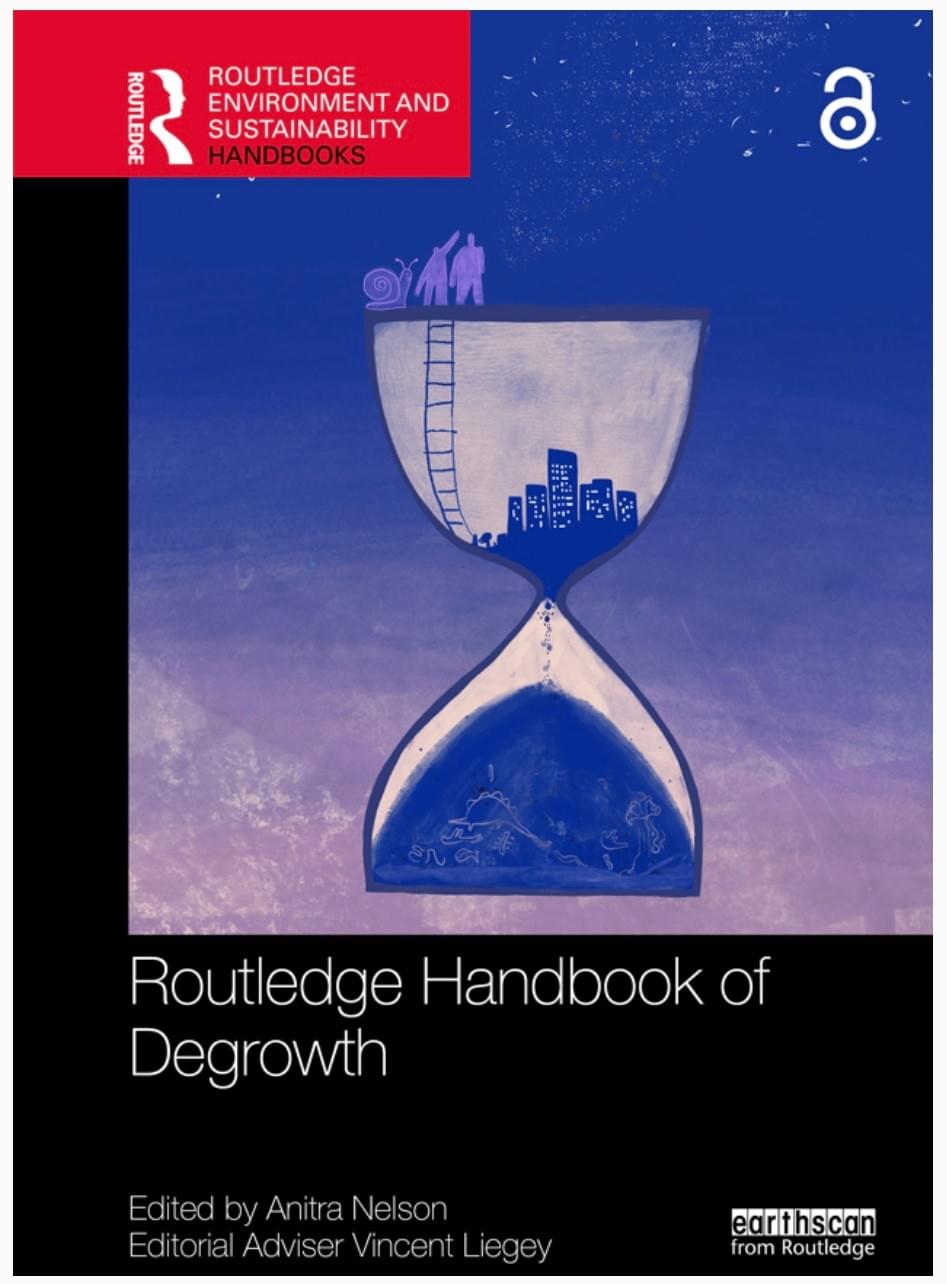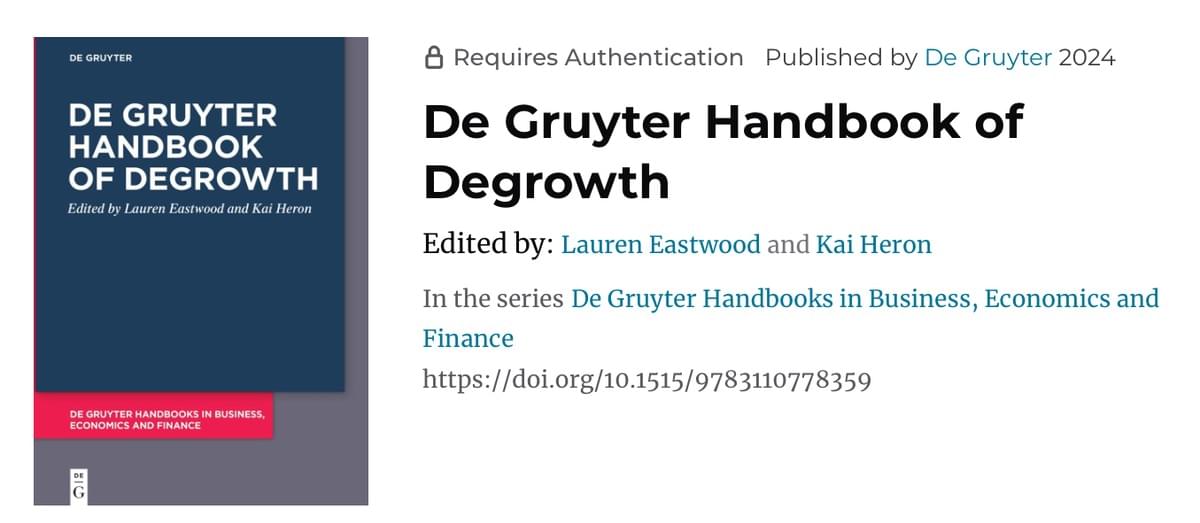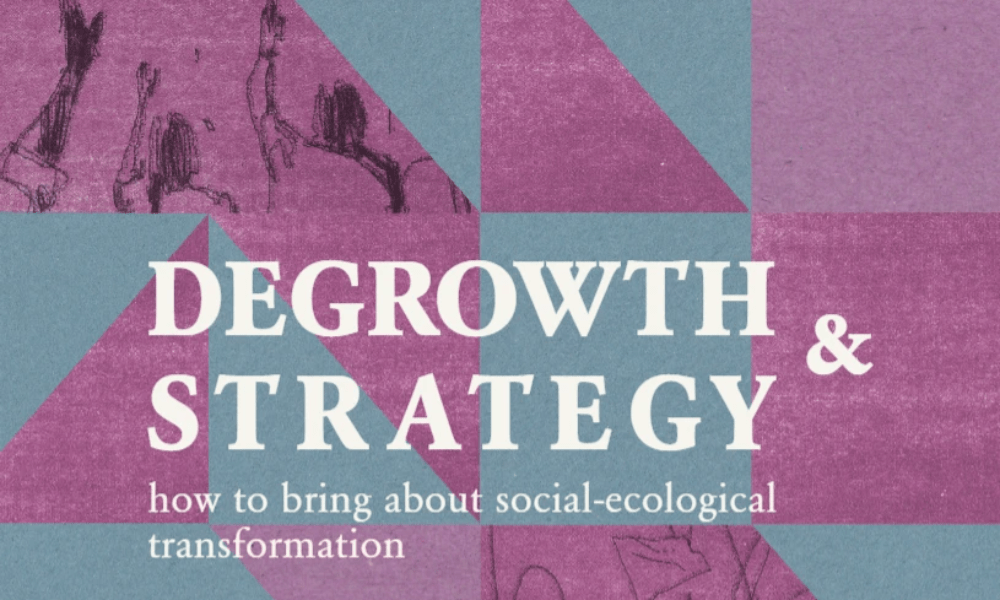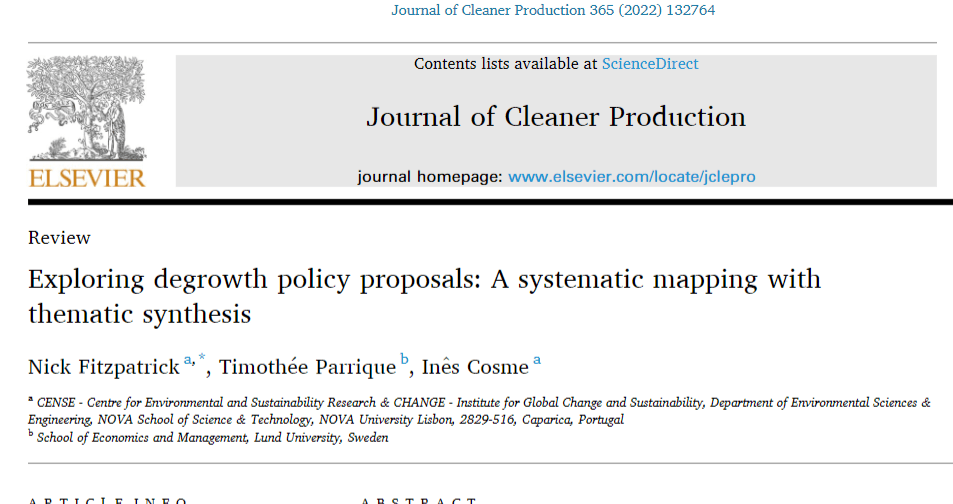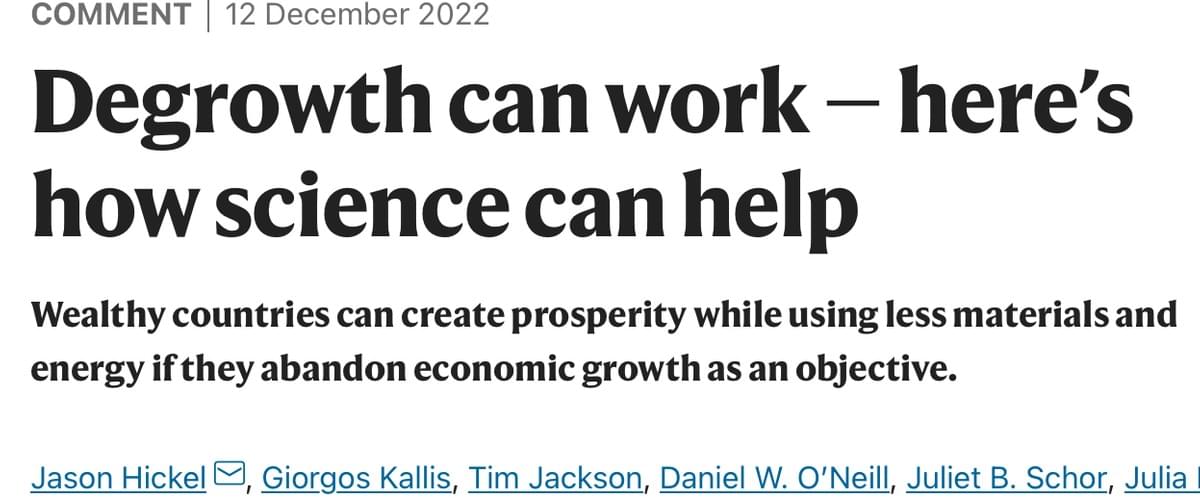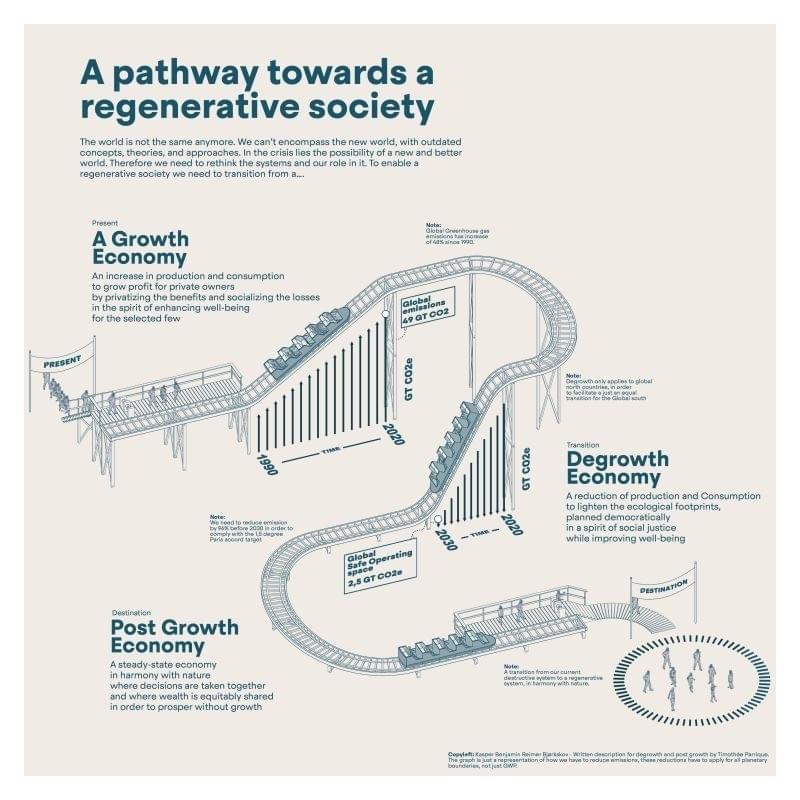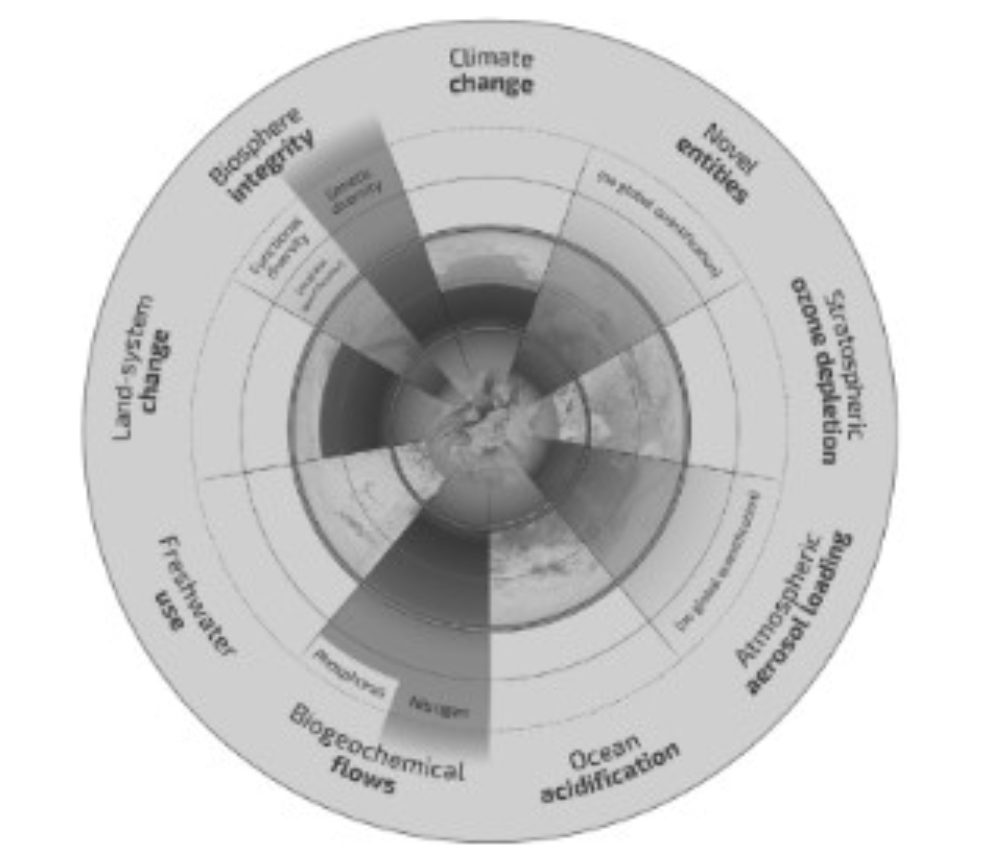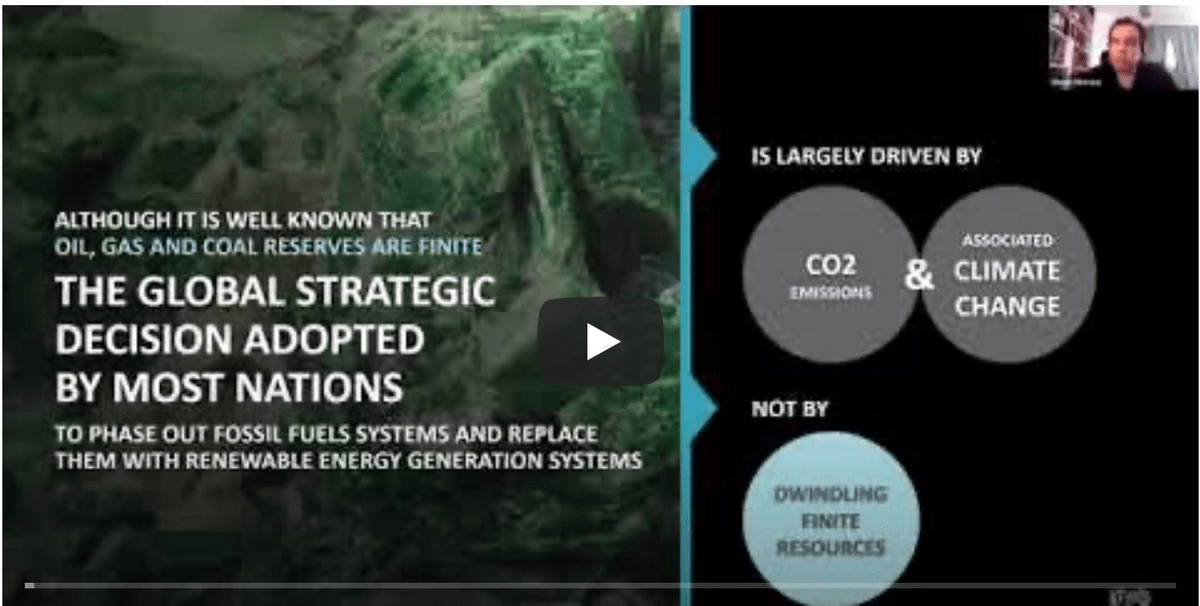
- What is Degrowth?
- Resources
- Connect
- …
- What is Degrowth?
- Resources
- Connect



- What is Degrowth?
- Resources
- Connect
- …
- What is Degrowth?
- Resources
- Connect

Degrowth: strategy & policy perspectives
About this book (pub: July 2025)
This handbook takes stock of ‘degrowth’, a concept and movement gaining increasing visibility in the 2020s. Contributors explain contexts for degrowth’s significance, elaborate its diverse history and detail its unique approaches, practices, challenges and potential futures.
Part I sets the ecological, economic and political contexts framing degrowth’s evolution as a significant concept for societies facing the challenges of deepening socio-political inequities and ecological unsustainabilities. Part II identifies themes characterising degrowth movements in a sample of distinctive countries, starting with its origins in France. Part III shows degrowth ‘concepts in action’, explaining in practical ways the meanings of terms such as ‘conviviality’, ‘degrowth doughnut’, ‘frugal abundance’, ‘commoning’ and ‘defashioning’. Part IV offers analyses and forward-looking imaginaries for degrowth from the perspectives of distinctive agents, agendas and theoretical frameworks. Contributors engage with topics such as ecofeminist futures, utopian thought and show how degrowth is necessary to address poverty.
Degrowth has emerged as one of the most exciting, and contested, fields of research into the drivers of global heating, ecological collapse, and economic injustice. The perspective is both a critique of existing growth-based models of development, which it argues have put humanity on a collision course with non-negotiable ecological limits, and a vision for a brighter future in which humans and non-humans alike can flourish. By putting an end to growth-seeking economic development and boundless energetic and material throughputs, degrowth’s proponents suggest we can build an economy that meets the material needs of people and planet for generations to come.
This handbook’s contributions signal the importance of degrowth across multiple disciplines and practices. Along the way, they grapple with some of the most critical questions, ideological assumptions, policies, and social struggles of our time.
The handbook approaches degrowth as a loosely knit and developing set of interdisciplinary propositions about what it might take to achieve a world of human and non-human flourishing. Contributors explore, challenge, and critique degrowth’s propositions and its prospects of shaping scholarly agendas, policy frameworks, and social movements. Essays consider degrowth from a variety of empirical and theoretical vantages, including urban design, architecture, political economy, political ecology, critical geography, and political theory. This integrative approach, at once critical and constructive, aims to preserve for readers the sense of possibility that has drawn people to degrowth scholarship thus far.
Provides contributions from both advocates and critics of degrowth.
Includes contributions from a wide range of fields across the social sciences.
Maps the growing importance and influence of degrowth across multiple disciplines.
Degrowth is a counter-hegemonic movement that has the ambitious aim of transforming society towards social and ecological justice. But how do we get there? That is the question this book addresses. Adhering to the multiplicity of degrowth whilst also arguing that strategic prioritisation and coordination are key, Degrowth & Strategy advances the debate on strategy for social-ecological transformation. It explores what strategising means, identifies key directions for the degrowth movement, and scrutinises strategies in practice that aim to realise a degrowth society. Bringing together voices from degrowth and related movements, this book creates a polyphony for change going beyond the sum of its parts.
Open Access. Read the full book here
A B S T R A C T
Degrowth – the planned and democratic reduction of production and consumption as a solution to the social-ecological crises – is slowly making its way to the sphere of policy-making. But there is a problem: proposals are scattered through a voluminous literature, making it difficult for decision-makers to pinpoint the concrete changes associated with the idea of degrowth. To address this issue, we conducted a systematic mapping of the degrowth literature from 2005 to 2020 using the RepOrting standards for Systematic Evidence Syntheses (ROSES) methodology. Out of a total of 1166 texts (articles, books, book chapters, and student theses) referring to degrowth, we identified 446 that include specific policy proposals. This systematic counting of policies led to a grand total of 530 proposals (50 goals, 100 objectives, 380 instruments), which makes it the most exhaustive degrowth policy agenda ever presented. To render this toolbox more accessible, we divided it into in 13 policy themes – food, culture and education, energy and environment, governance and geopolitics, indicators, inequality, finance, production and consumption, science and technology, tourism, trade, urban planning, and work – systematically making the difference between goals, objectives, and instruments. Following this, we assess the precision, frequency, quality, and diversity of this agenda, reflecting on how the degrowth policy toolbox has been evolving until today.
Open Access. Read the full article here"This clear-eyed, scientifically based yet extremely readable book is essential reading. Read it to learn in careful and systematic detail why the relentless pursuit of growth of monetary incomes, without considering its patterns and ignoring its inequalities, is leading humanity headlong into disaster. But read it also for hope: to learn that changing course is possible. There are feasible ways to fulfil human needs equitably, with respect for nature and the planet, which would save the planet, transform societies, and enrich all of us."
-Jayati Ghosh Ph.D. Professor of Economics at the University of Massachusetts Amherst, and member of the United Nations Secretary-General’s High-Level Advisory Board of Effective Multilateralism
Open Access. Read the full book here
Key policies that affluent economies can implement to achieve an equitable Degrowth transition:
- Reduce unnecessary production
- Improve public services
- Introduce a green jobs guarantee
- Reduce working time
- Enable sustainable development
Comprehensive strategy for Degrowth will mean exploring the need to:
- Remove dependencies on growth
- Fund public service
- Manage working-time reductions
- Reshape provisioning systems

Fourteen Propositions for Planning an
Escape from Overshoot:
- There is compelling evidence that humanity is living in an era of global overshoot.
- A reduction in the physical scale of the human enterprise is essential to escape from overshoot.
- The historical and current causes and consequences of overshoot are extremely unequal within and among countries.
- Limits on material and energy throughput and land transformation are critical to an escape from overshoot.
- Contraction and convergence is an appropriate ethical principle for building an escape plan.
- A planned escape from overshoot requires a common sense of purpose such as has been seen in times of war and pandemics.
- A common sense of purpose should be founded on principles of justice, otherwise the escape plan will be compromised by people and institutions seeking their own self-interest rather than working towards shared objectives. These principles of justice should encompass non-human life as well as human.
- A common sense of purpose is more likely to emerge from forms of democracy that combine representation and participation, and which are based on the principle of subsidiarity-that social, political, and environmental issues are best dealt with at the most immediate level consistent with their resolution.
- Reductions in population should be welcomed, planned for, and encouraged through increased measures such as: accessibility to education especially for girls, increased availability of contraception, provision of a basic income and wealth, and better support for the elderly.
- Finance should facilitate the escape from overshoot rather than exacerbate it. To this end, money creation by commercial banks should be curtailed. The financialization of nature and the implication that it exists solely to serve human interests, should be halted and reversed.
- Technology does not exist in isolation. It is embodied in materials and requires energy for its
production and use. Technologies often have unintended consequences which can be positive and negative. Whether and how technology contributes to the escape from overshoot depends on who owns it and what they seek to obtain from that ownership. - Knowledge and ideas should be shared as much as possible given that they are non-rival. Exclusion of
potential users through intellectual property rights should be discouraged, especially where it impedes the flow of information, products, and services to low-income countries as happened, for example, during the COVID-19 pandemic. - Capitalism presents serious obstacles to an escape from overshoot. It serves the interests of the owners of capital, who, through increasingly powerful corporations, are constantly looking for ways to extend their reach, increasing overshoot,
and only incidentally serving the interests of other members of society. Experience with Socialism has a mixed record in relation to overshoot, having focused on growth almost as much as in capitalism,
and it has shown the shortcomings of central planning. - Overshoot will transform economic and political systems. It is better to choose the transformations we want rather than have them forced upon us by
circumstances beyond our control.
Ref: Ecological Economics
Mother Pelican ~ A Journal of Solidarity and Sustainability(pelicanweb.org)
Associate Professor Simon Michaux’s lecture, ‘Re-thinking Sustainability and the Green Transition’
Overview:
The current ecosystem has no concept of its dependency on minerals and does not consider long-term concepts like continuous growth in production against finite resources.
Tasks to be done:
- Conduct a Maslow hierarchy of needs analysis loop inthe context of industrial activity and capacity.
- What is truly needed for society to function and workback from there.
- Develop engineering technology that can cope with variable power supply and power spikes (buffer to intermittency then no longer
needed).- Plan for an economy where some industrial capability can periodically shutdown and startup without damage and a possible period of dormancy over winter.
- Develop an engineering decision-making system that can define whether an industrial outcome is logistically sensible or economically viable to a new set of constraints.
- Re-tool the existing power grid into a network of microgrids, that can transfer power between them and can still function if part of the grid is temporarily shut down. Each grid supports a vital industrial or social activity.
- Plan for a re-prioritisation of industrial capacity.
